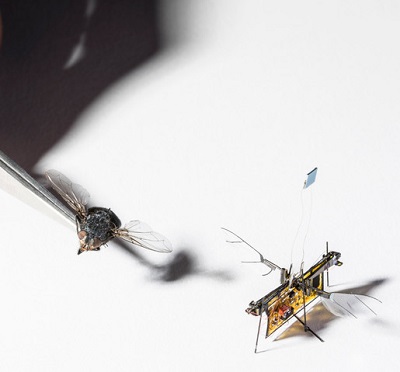Swarms of tiny robots that carry out time consuming tasks could soon become a common sight after scientists figured out how to attach a “brain” to the mini laser-powered machines.
The University of Washington research team that created the insect-inspired droids says they could be used for a range of jobs, including surveying crops and sniffing out gas leaks, according to RT.
The fly-sized robots are too small to use propellers, so they work by fluttering their tiny wings. Previous attempts to create robo-insects were limited by the fact that the electronics needed to power and control their wings were too heavy for the machines to carry, so they had to be controlled through wires from the ground.
However, the engineers figured out a way to use an invisible laser beam to power the bugs.
“Before now, the concept of wireless insect-sized flying robots was science fiction. Would we ever be able to make them work without needing a wire?” asked co-author Sawyer Fuller, from the university’s Department of Mechanical Engineering. “Our new wireless RoboFly shows they’re much closer to real life.”
The engineers also added a microcontroller to its circuit to allow the robot to control its wings. “The microcontroller acts like a real fly’s brain telling wing muscles when to fire,” explained one of the researchers, Vikram Iyer. “On RoboFly, it tells the wings things like ‘flap hard now’ or ‘don’t flap.’”
The controller sends a series of pulses in rapid succession to make the wings flap forward swiftly. It also does this in reverse to make the wings flap smoothly in the other direction.
The current version of RoboFly can only take off and land, as once its out of the direct beam of the laser, it runs out of power. However, the team hopes to soon be able to steer the laser so that the robot can hover and fly around.
Future versions could be powered by tiny batteries or harvest energy from radio frequency signals that would allow them to be modified for specific tasks.
The tiny bot is the latest eerie example of scientific breakthroughs seemingly following the lead of the dystopian TV program Black Mirror. In the show, though, the insects were hacked and modified into killing machines that murdered thousands of people. Here’s hoping the RoboFly is more secure.
H.Z

